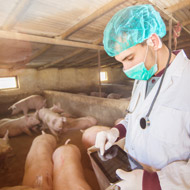Debate over official controls in slaughterhouses

The BVA said OVs are vital for the protection of UK consumers.
The BVA has said it is “extremely disappointing” that the Association of Independent Meat Suppliers (AIMS) is calling for the removal of requirements to have official veterinarians (OVs) in non-exporting slaughterhouses.
BVA president Gudrun Ravetz and Lewis Grant, president of the Veterinary Public Health Association (VPHA), made the comments in response to a letter by Peter Hawson, veterinary director of AIMS, in Vet Record.
Mr Hawson said Brexit is an opportunity to replace current controls with a two-tier, risk-based system.
He wrote: ’Where importing countries required additional, non-risk based controls, such as some of those currently carried out by OVs, then they would need to be provided, but there is no reason why such controls should impose unnecessary burdens on the domestic sector and unnecessary costs to the UK tax payer.
‘Transferring responsibility for controls from OVs to the food business operator (FBO), with appropriate audit and effective enforcement by the competent authority, would remove the necessity for the full time presence of OVs at non-exporting slaughterhouses and place the responsibility for producing safe meat firmly with the operator.’
Mr Hawson believes this will provide ‘optimal protection for public health’, arguing that ante- and post-mortem inspections do not detect the main health hazards associated with fresh meat - campylobacter, salmonella species and Escherichia coli O157 - as identified by the European Food Safety Authority (EFSA).
However, the BVA said OVs are vital for the protection of UK consumers, certifying and supervising the import and export of animals and animal products to third countries.
Ravetz and Grant wrote in Vet Record: ’Doing away with a full-time OV presence in non-exporting slaughterhouses risks creating two standards of production, processing and certification; one for domestic, and one for export markets, and opening the door to potential food fraud.’
Another important part of the OV’s slaughterhouse duties is monitoring and advocating animal welfare, they continued, stating that animal welfare has ‘improved dramatically’ since OVs have attended slaughterhouses.
Whilst the BVA agrees that ante- and post-mortems do not detect the three primary hazards identified by EFSA, OVs check the FBO’s adherence to clean livestock policies to reduce the risk of spreading E. coli O157 in the slaughterhouse. Checks are also carried out to ensure hygienic practices on poultry production lines to reduce the risk of campylobacter.
In addition to those listed as principle hazards, many other important diseases are also identified by OVs in slaughterhouses, including the last major foot-and-mouth disease outbreak, Ravetz and Grant pointed out.
The BVA is calling on the government to apply a single standard to meat production for foreign markets and UK consumers, to avoid confusion, opportunities for fraud and compromised animal welfare.



 The Federation of Independent Veterinary Practices (FIVP) has announced a third season of its podcast, Practice Matters.
The Federation of Independent Veterinary Practices (FIVP) has announced a third season of its podcast, Practice Matters.